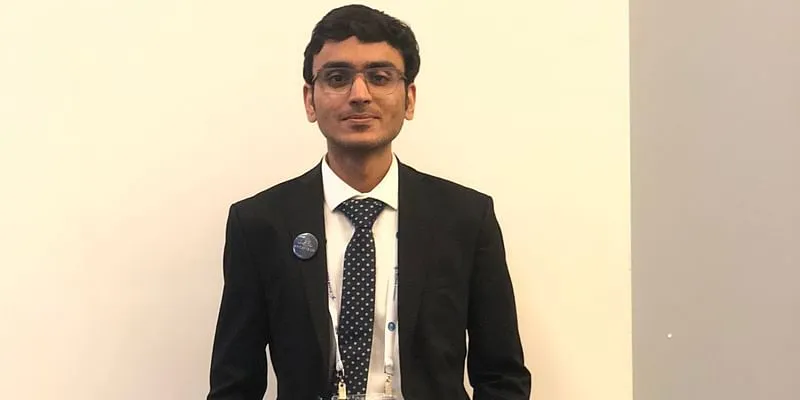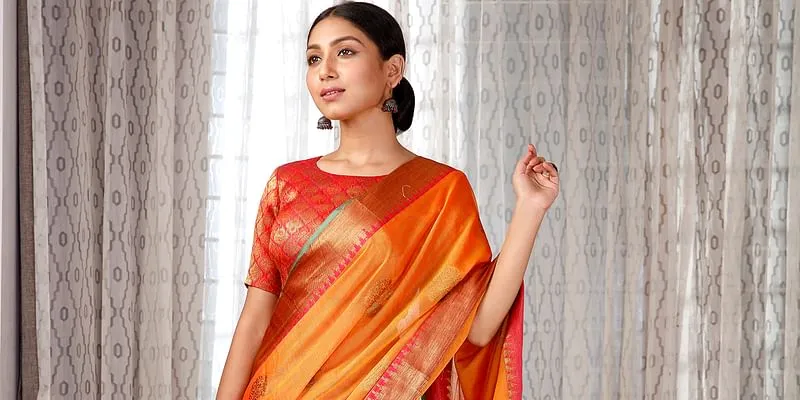Started as a B2B saree brand, this five-decade-old business took the D2C route to ride out the pandemic
Founded in 1966, Banaras-based saree brand GN Bros Sarees Pvt Ltd started golghar.org to promote authentic Banarasi sarees and other ethnic wear from the region.
While the pandemic has been exceptionally challenging for businesses, online shopping has been a boon - not just for business owners, but for shoppers too.
Mukund B Agrawal, Director of Banaras-based GN Bros Sarees Pvt Ltd, had always dreamt of having an online store that was exclusive. While the thought of going online first occurred to him in 2005, it took a pandemic fifteen years later for this dream to turn into reality.
"The pandemic brought our business to a grinding halt, hence, we thought of reinvigorating our online project. It was a really good opportunity for us, so we decided to take it up seriously and work on it for long term growth," says Mukund, the brainchild behind golghar.org, an online portal that went live in August 2020.

Mukund B Agrawal
Owned and operated by GN Designer Handlooms Pvt Ltd, a subsidiary of GN Bros Sarees Pvt Ltd, golghar.org sells ethnic wear for women including Banarasi sarees, designer blouses, Banarasi suits and dupattas.
golghar.org also offers custom suit and other garment stitching services. The startup currently has 300 odd SKUs on its website.
Speaking to SMBStory, Adarsh Agrawal, Mukund’s son and founder of golghar.org says, “My dad hired several website designers over the years, who failed miserably every time. By 2020, there were four failed attempts at website making. This time I personally took up the job to build it from scratch, and tried to shape it according to his vision."

Adarsh Agrawal
golghar.org is a five member team right now. “Our wholesale company (GN Bros Sarees Pvt Ltd) altogether has a 100 employee workforce, however the online division has less members right now,” adds Adarsh.
Employment for local talent
The ancient city of Banaras is known as the land of miracles. Thousands of weavers and artisans from in and around the city are known for their creativity, but many are left wanting more exposure and the right means to sustain the invaluable art of knitting Banarasi sarees.
“We work directly with the artisans, supporting hundreds of weavers by directly employing them for our manufacturing process,” says Adarsh.
“We also own and operate a garment manufacturing unit (Development Commissioner Handloom or DC Handloom) in Purvanchal. It was built in collaboration with the Ministry of Textiles, Government of India,” he adds.
According to Adarsh, the facility employs thousands of tailors, craftsmen and garment workers directly from villages (since the facility is built in the outskirts of the city, the villagers can commute easily). A huge part of the factory includes women from rural households, both married and unmarried, who are intricately skilled in the art of weaving Banarasi sarees.
“golghar.org has had 40 percent growth from August 2020 to March 2021, which we aim to increase to 90 percent in coming months by increasing our product ranges and extensive product marketing. Since we manufacture all our products ourselves, we have huge scope to perform R&D, and make products that the markets have never seen before,” says Adarsh.
The facility produces around 1 lakh sarees and 1.5 lakh readymade garments per month.
golghar.org is also closely working with the Aditya Birla Group by utilising their LIVA fabric (The LIVA fabric technology is a property of Aditya Birla Group) to manufacture sarees that are fluidic in nature and feels like second skin. The startup is among the privileged few brands to adorn the Indian Handloom Brand (IHB) logo on certain classes of its products. The Handloom Mark Scheme was launched by the Government of India on June 28, 2006 to provide assurance to the consumers about authenticity of handloom products.
According to the National Handloom Development Corporation (NHDC), the registration for India Handloom is granted only to certain specified eligible entities in respect of identified product categories which meet prescribed quality parameters.
The target audience
According to Adarsh, 75 percent of golghar.org’s clientele are women, and most of the purchases come from the age group of 25 to 35.

“We have an esteemed customer base, and a majority of orders come in from Delhi, Bengaluru and Mumbai,” notes Adarsh.
Way ahead
By the third quarter of 2021, golghar.org aims to process 50 orders every day from the website to be able to provide enough volume to its weaver partners.
“We aim to increase the SKUs present on our website to around 2500 to 3000. We are also planning to offer more options on women's wear, like kurtis, stoles and other designer clothing to become a one-stop destination for all ethnic women's clothing needs,” Adarsh says.
The company owns multiple physical showrooms across Banaras, and also a retail and wholesale showroom in Bengaluru. However, Adarsh says that a major chunk of revenue currently comes from their over five decade old wholesale business.
Started with an investment of Rs 1.5 lakh, golghar.org is currently bootstrapped and not looking for funding.
“We are growing 10-15 percent per month, and we expect to increase our online catalogue by three folds, which will render a projected growth of 30 to 40 percent in the coming months,” says Adarsh.
According to Technopak, ethnic wear is the single biggest category within the women’s wear segment, covering 71 percent. And within the ethnic wear segment, the saree is perhaps the most popular - holding an estimated 33 percent market value of Rs 39,350 crore, and expected to grow at a CAGR of 2.8 percent to reach Rs 51,866 crore by 2027.
Going by the stats, it is no wonder that many Indian startups are working to improve the livelihoods of artisans and weavers by promoting and selling their products, especially sarees. Some of them include Inde’ Loom, Byloom, Suta, Bharatsthali, Taneira, Parisera, Karagiri and Yes!poho, among others.
Edited by Anju Narayanan








